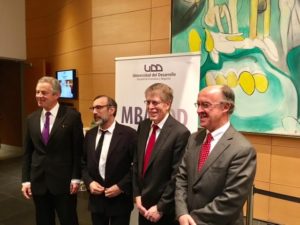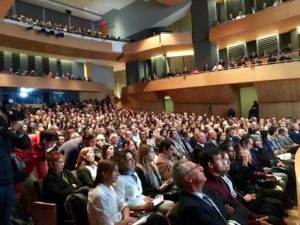
I recently returned from my first trip to Chile. There is a long-standing, well-known connection between the University of Chicago and Chile. The Pinochet regime in Chile is renowned for two reasons – political repression and economic reforms. The former was brutal and indefensible, while the latter had a long-lasting positive impact on the Chilean economy. Indeed, in terms of economics, Chile has become one of the best success stories in Latin America. The so-called “Chicago boys,” trained at the University of Chicago, played a central role in designing and implementing liberal reforms following the economically flawed policies of the previous socialist government of Allende. The long-term impact of some of these reforms has been an interesting and valuable test case for economists and governments.
Against this backdrop, I was pleased to visit Chile in person, to share ideas and learn from local expert economists and policy-makers. During my two and half-day visit, I gave three talks in total. One of the lectures was an academic talk at the Pontifical Catholic University of Chile, and another was an open lecture to about 600 people at an event in downtown Chile hosted by University of Desarrollo (University for Development) in Santiago. My third talk was during a dinner to a group of about 130 interested alumni.
In addition, I had two very productive lunches, one at the Pontifical Catholic University and another at the Central Bank of Chile, along with a small dinner with faculty from Catholic University. My talks focused on uncertainty conceived broadly and its implications for markets and policy. The lunches and private dinner were fascinating to me, as they allowed to me engage in wide-ranging policy discussions pertinent for both the Chilean and the U.S. economies.
As part of the economic reforms of the past, Chile designed a pension system to help people save for their own retirement and to avoid burdening current taxpayers to support the pensions of existing retirees. While I like the aims and basic design, the current pension system is under attack because many retirees expected to be in better shape financially. They did not save sufficiently to provide the retirement income they hoped they would receive. There are some calls to have the government scrap the basic approach, but this would be a mistake. In my view, it would be better to structure incentives and encourage more savings from some during their working lives. Transient subsidies might be required in the short run, but these should be phased out. Thus, it would be best to make some repairs to the pension system without scrapping the basic approach.

There is a move afoot to provide free education including college or undergraduate education. I am sympathetic to some educational subsidies, but one has to ensure that these investments are done wisely. As my colleague Jim Heckman likes to emphasize, early childhood education can be a valuable social investment. In contrast, government guarantees for free college education are apparently being tied to more governmental control on how the higher education is to be provided and valued. This can be truly counterproductive. I would rather continue to see multiple colleges and universities flourish, nurtured in part by competition. I was also pleased to learn more about the successes and limitations of the voucher system in Chile, aimed at providing school choice and nurturing productive competition.
For these and other reasons, my visit to Chile expanded my understanding of economic policy in practice. The trip served as a reminder that there is more to policy design than abstract constructs that look appealing. The details of implementation are significant and sometimes require a form of “learning by doing.”
At the Central Bank of Chile, I had the opportunity to discuss some of the Macro Finance Research Program (MFR) projects that are currently being undertaken. The Central Bank of Chile will be co-hosting a MFR/BFI event next summer which will take a systematic inventory of what we have learned from the observed and documented monetary and fiscal histories of Latin America.
I very much look forward to my opportunity to return the Chile, and I even hope to have the opportunity to ski there during the summer months in the northern hemisphere.
Pontifical Catholic University Lecture Slides
University of Desarrollo Lecture Slides
